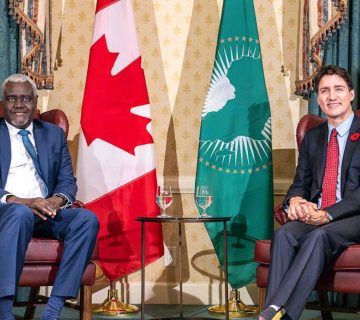Kenya has withdrawn from the maritime border case with Somalia before the International Court of Justice (ICJ), whose official public hearing began at the Court on March 15, 2021. The withdrawal has been informed by what Nairobi has described as “perceived bias and unwillingness of the Court to accommodate requests for the delay of the hearing as a result of the COVID-19 pandemic”.
The Court began the hearings based on Article 9 of the United Nations Convention on the Law of the Sea (UNCLOS) which allows the adjudication of the case even in the absence of one of the parties. Earlier on, the court had declined Kenya’s request to address its chambers for 30 minutes before the commencement of the public hearings. The Court did not give any explanation as to why it declined this request. Kenya prefers an out-of-court, negotiated settlement of the maritime dispute and has previously made efforts to reach out to Somalia to seek a mutual agreement over the maritime border. Kenya’s non-participation in the case means that Nairobi ceases to recognize the case and would remain unaffected by the verdict delivered by the Court. Failure by the Court to accommodate Kenya’s request, however, poses legitimacy questions as Kenya may reject its decision should it be seen as averse to Kenya’s position.
Genesis
The maritime dispute between Kenya and Somalia concerns the ownership of the maritime zone on the outer limits of the continental shelf beyond 200 nautical miles in the Indian Ocean. The disputed area is believed to contain huge deposits of oil and gas. The dispute is the result of a clash of principles in determining each country’s territorial boundary in the Indian Ocean. While Somalia claims that its territory should be determined based on the principle of equidistance, thus rendering a south-eastward running border, Kenya holds that it is based on the principle of parallel of latitudes and that the border runs eastward from the shore. Kenya argues that it has exercised uncontested jurisdiction over the maritime zone since 1979 when it proclaimed it as an Exclusive Economic Zone (EEZ) in line with colonial legacies embraced under the Africa Union Border Program which both Kenya and Somalia are signatories. In addition, Kenya’s maritime border follows the same pattern as that of Tanzania and Mozambique.
On August 28, 2014, Somalia filed a case at the ICJ accusing Kenya of encroaching into its maritime zone and asked the Court to delimit the contested area. Although Kenya contested the Court’s jurisdiction over the matter, the ICJ seized the matter in 2017. In 2019, Somalia allegedly tried to auction minerals in the contested area.
The previous schedules for the public hearing of the case – in September 2019 and June 2020 – were extended by the Court at the request of Kenya to allow adequate time to recruit a legal team and prepare documentation for legal defence in the case. The new date of hearing was set to be March 2021. In January 2021, Kenya submitted a fresh application to the Court to grant another extension as it needed it to finalize its preparations following disruptions occasioned by the COVID-19 pandemic. However, after Somalia protested, the Court declined Kenya’s request and maintained its schedule to commence hearing on March 15, 2021.
The time for the determination of cases before ICJ is not predefined. The Somalia v. Kenya case has lasted seven years so far. However, similar cases have lasted longer. For instance, it took 41 years to determine the case between Benin and Niger; 36 years for Burkina Faso and Niger; and 26 years to determine Qatar versus Bahrain case. Kenya’s request for further extension of the official hearings is not contradictory to ICJ’s norms. Moreover, granting additional time would enable the two neighboring countries to seek alternatives for a win-win solution that would defeat the possibility of a ‘zero-sum’ verdict from the court, which may be unacceptable by either party.
Implication of Kenya’s Withdrawal
The withdrawal of Kenya’s participation means that Nairobi ceases to recognize the case and would thus remain unaffected by the proceedings and the Court’s eventual verdict. Although the Court is mandated to carry on with the legal proceedings and determine the case even without Kenya’s participation, the implementation of the ruling will face significant challenges. First, the ICJ lacks an enforcement mechanism for its decisions and relies on the goodwill of the parties in conflict to comply with rulings or the United Nations Security Council to enforce its ruling. In this case, an unfavorable verdict against Kenya may be protested and Nairobi may neither respect nor implement the Court’s decision. Second, Kenya has accused the Court of bias and unwillingness to accommodate its request to delay the hearing of the case, which means that any verdict arrived at by the Court without Kenya’s effective participation would suffer serious legitimacy concerns. For instance, an adverse decision to Kenya may be blamed on the Court on the account of its refusal to allow Kenya to effectively prepare for the case.
There is also a possibility that a decision based on the equidistance principle may set off an acrimonious maritime confrontation between the two countries and destabilize maritime relations southward along the Indian Ocean Coast with Tanzania and Mozambique whose current maritime borders follow the parallel of latitudes principle.
Otieno O. Joel is a Researcher at the HORN Institute.
Photo: A man looks at the Indian Ocean. Kenya has withdrawn from the public hearings of the Somalia v. Kenya case that started on March 15, 2021 (Photo Credit: AFP)



